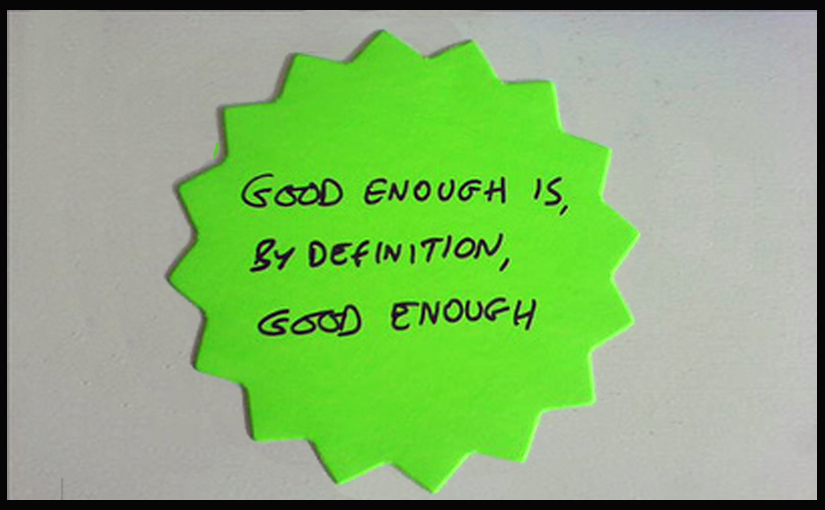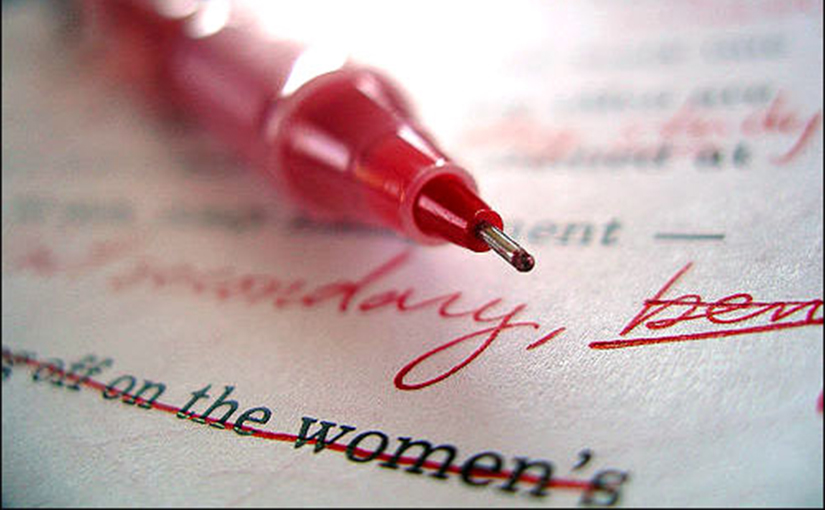I teach this course to help PhD researchers complete their research and write their theses. Other professors may not like it when I say this, but my objective is that your thesis, and your oral defense of it, are ‘good enough’ to pass. Of course, I am thrilled at the idea of supervising or examining an exceptionally clear and beautifully written thesis about life-changing research of global impact. But, my aim is for you to produce a thesis that is good enough to get you a PhD. This positions the PhD thesis and your oral examination as a springboard into your post-PhD life. As David D. Perlmutter says in his article for The Chronicle of Higher Education, “Graduate students should remember that the dissertation is the beginning of their research, not the endpoint”. I would add ” or professional life” as many of you will not be planning to stay in academia or move on to a research position in industry.
Getting a PhD done and writing a good enough thesis is as much about knowing what not to do as getting advice about what to do.
Writing in the Times Higher Education Supplement, Tara Brabazon lists her top ten tips for doctoral failure. With comments by Jane Prophet added in italics.
1. Submit an incomplete, poorly formatted bibliography
Jane: I read the bibliography carefully. It adds to my workload to have to correct mistakes. Check your bibliography carefully. Ask a couple of friends to read it through. Sort out every little punctuation and style error. One or two mistakes are OK, but more cause me to wonder how rushed the thesis completion was and what else has been missed out..
Many examiners start from the back of the script. The moment examiners see incomplete references or find that key theorists in the topic are absent, they worry. This concern intensifies when in-text citations with no match in the bibliography are located.
Jane: Elsewhere I discuss ‘relaxing’ the examiner by explaining very early on in the thesis why a key theorist or topic has been omitted. To do this you will reference that key theorist or topic. This is even more important because you cannot control whether an examiner reads the bibliography first.
2. Use phrases such as “some academics” or “all the literature” without mitigating statements or references.
“In a PhD, generalisations send me off for a long walk to Beachy Head.”
Jane: For those of you from outside the UK, Beachy Head is infamous for being a high cliff that suicidal people throw themselves off. Generalisations don’t make me suicidal but they do trigger an eye-roll and send up a red flag. I then start to wonder if the line of argument may be similarly sloppy. Too many generalisations and I fantasise about throwing the thesis off a cliff.
3. Write an abstract without a sentence starting “my original contribution to knowledge is…”
Relax the examiner with a sentence in the first paragraph of a PhD abstract that begins: “My original contribution to knowledge is…” If examiners cannot pinpoint the original contribution, they have no choice but to award the script an MPhil.
Jane: This is one of my pet peeves. Get your original contribution to knowledge clear and get it out there. Own it, be confident about it. This is another reason I ask you to explain your PhD in 60 seconds. As you practice you add information about your method AND your contribution to knowledge. In one of my first lecture and blog posts I discussed the potential scale of the contribution to knowledge and noted it could be modest.
4. Fill the bibliography with references to blogs, online journalism and textbooks. Students do not differentiate between refereed and non-refereed or primary and secondary sources.
Jane: You can use these, just don’t overdo it. Remember to carefully contextualise them and critically analyse them. Make it clear that you know they are not refereed or are secondary. If keys texts have been translated from another language remember they are secondary. Approach with caution! Recently I read a piece that brought attention to the problem of working with primary sources that had been translated (in this case into English).
5. Use discourse, ideology, signifier, signified, interpellation, postmodernism, structuralism, post-structuralism or deconstruction without reading the complete works of Foucault, Althusser, Saussure, Baudrillard or Derrida.
How to upset an examiner in under 60 seconds: throw basic semiotic phrases into a sentence as if they are punctuation.
Jane: I don’t agree with the ‘complete works’ element of this comment. But. Some examiners do think this way. Choose your theoretical framework carefully, remember that often less is more. There is a tendency by many art and interdisciplinary PhD researchers to use too many sources and methods at the expense of engaging deeply with any one of them. Don’t be that PhD researcher. You have to focus. Save some of your favs for your post-PhD papers or for influencing your non-academic post-PhD careers.
6. Assume something you are doing is new because you have not read enough to know that an academic wrote a book on it 20 years ago.
7. Leave spelling mistakes in the script.
8. Make the topic of the thesis too large.
Jane: arts and interdisciplinary researchers, is this you? If it is, get a grip on the domain you are looking at. Get disciplined. Your PhD research is tough enough without spreading yourself too thin. Not going deep enough risks an unconvincing contribution to knowledge. Just bringing a lot of different ideas together does not equal a contribution to knowledge, you have to show clearly how their recombination by you expands the field(s). It’s another red flag that to the examiner.
The best PhDs are small. They investigate a circumscribed area, rather than over-emphasising the originality or expertise.
The nightmare PhD for examiners is the candidate who tries to compress a life’s work into 100,000 words. They attempt to distill 100 years of history, theory, dissent and debate into a literature review.
9. Write a short, rushed, basic exegesis
An unfair – but occasionally accurate – cliché of practice-led doctorates is that students take three and a half years to make a film, installation or soundscape and spend three and a half weeks writing the exegesis. Doctoral candidates seem unaware that examiners often read exegeses first and engage with the artefacts after assessing if candidates have read enough in the field.
10. Submit a PhD with a short introduction or conclusion
A quick way to move from a good doctoral thesis to one requiring major corrections is to write a short introduction and/or conclusion. It is frustrating for examiners. We are poised to tick the minor corrections box, and then we turn to a one- or two-page conclusion.
After reading thousands of words, students must be able to present effective, convincing conclusions, restating the original contribution to knowledge, the significance of the research, the problems and flaws and further areas of scholarship.


